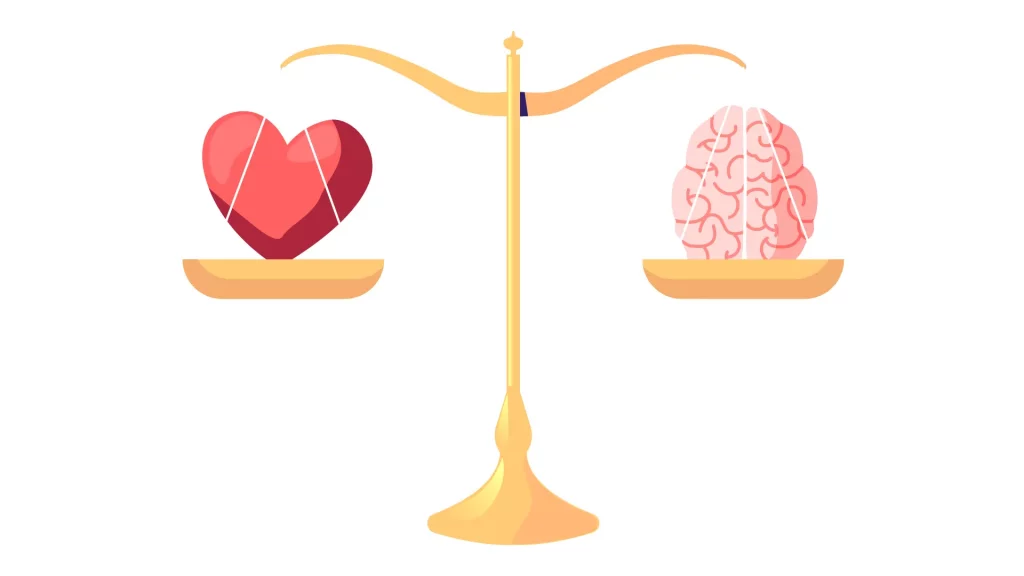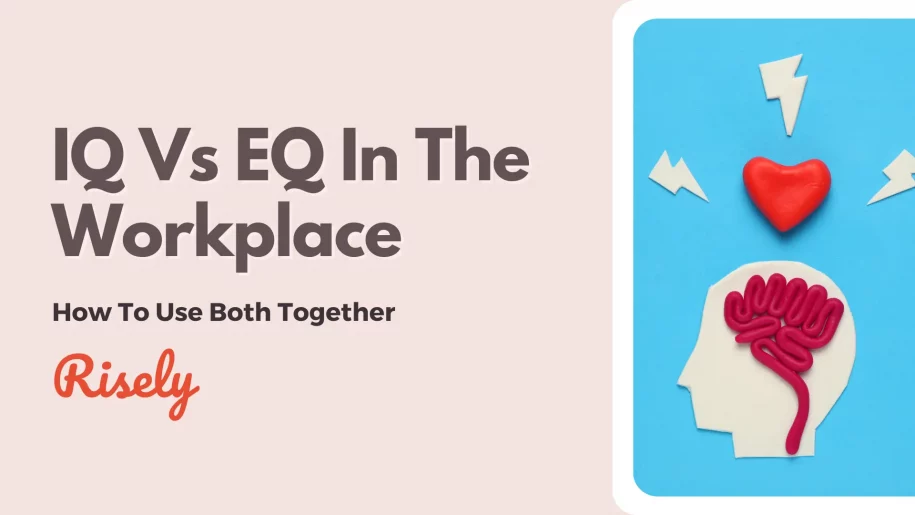IQ Vs EQ In The Workplace: How To Use Both Together?
When it comes to being an effective manager, what takes the lead – your head or your heart? For most of us, titling either way is a problematic notion. For ages, leaders are picture-perfect. Cold in their manners, assertive in simple ways, and super calculative. But things have changed, too. Many experts deem emotions as a crucial part of effective leadership these days. With emotional competence featuring heavily in leadership essentials, is it time for the intelligence quotient to step back? Maybe not. Let’s figure out from the start.- IQ Vs EQ In The Workplace: How To Use Both Together?
- What is Intelligence Quotient (IQ)?
- What is Emotional Quotient (EQ)?
- What’s the Difference? IQ vs EQ in the Workplace
- Beyond IQ and EQ at Work – What’s More in Intelligence?
- Which is More Important in The Workplace: Emotional Intelligence or Intellectual Intelligence?
- 7 Ways to Boost Your IQ and EQ at Work
- Conclusion
- FAQs
- Other Related Blogs
What is Intelligence Quotient (IQ)?
The first player in IQ vs EQ is IQ. IQ, or Intelligence Quotient, measures a person’s intellectual abilities in relation to others. It is a standardized test score to assess cognitive intelligence, including reasoning, problem-solving skills, memory, mathematical ability, and linguistic comprehension. The concept of IQ is rooted in the idea of general intelligence or “g factor,” suggesting that various cognitive abilities are positively correlated and can be summarized by a single numerical value. In its earliest form, IQ was the ratio of a person’s mental age to their actual age. The average peer group IQ was said to be 100. Over the years, progress in research has made multiple additions to theory and testing. At present, the Stanford-Binet test is the most popular IQ test. It has become a measurement of how one performs in a mental test, from which conclusions on ability are generalized. IQ tests are often used in educational and employment settings to evaluate cognitive abilities and predict academic and job performance. However, intelligence is not a method that can yield concrete measurements. IQ scores are related to several factors, such as childhood experiences, nutrition, socioeconomic status of parents, etc.
What is Emotional Quotient (EQ)?
The second component of IQ vs EQ is EQ. The other corollary concept is EQ or emotional quotient. EQ, or Emotional Quotient, refers to a person’s ability to understand, manage, and express their own emotions, as well as their ability to understand and influence the feelings of others. Unlike IQ, which focuses on cognitive abilities, EQ emphasizes emotional intelligence and social skills. Emotional intelligence includes self-awareness, self-regulation, motivation, empathy, and social skills. EQ is a concept that has been studied extensively over the years, and it has a lot to offer managers.The theory behind EQ is that it’s vital for managers because it helps them perceive, understand, and relate to emotions from other people. It helps them empathize with their employees and fosters an excellent work-life balance. The concept of EQ is not new; it first appeared in the 1960s. Later on, the famous book by Daniel Goleman, called Emotional Intelligence, brought the spotlight onto it. Various models have been developed to understand EQ better. EQ measurement tools are subject to heavy criticism, primarily due to the assumed co-dependence between EQ and IQ and the perceived challenges in measuring emotional ability. You can read more about perceived gender differences in EQ here.What’s the Difference? IQ vs EQ in the Workplace
IQ
- Intelligence Quotient primarily measures cognitive abilities, such as logical reasoning, problem-solving, memory, and mathematical proficiency. It focuses on intellectual capabilities.
- IQ tests emphasize cognitive abilities and skills traditionally associated with academic success and intellectual performance.
- While cognitive intelligence is important, especially in analytical roles, applying IQ in work settings is more specific to tasks requiring logical reasoning and problem-solving.
- Cognitive intelligence is crucial for problem-solving and analytical tasks, having a high IQ does not necessarily correlate with effective leadership. Leadership success often requires a combination of cognitive intelligence, emotional intelligence, and other leadership-related skills.
EQ
- Emotional Quotient, on the other hand, measures emotional intelligence. It assesses skills in understanding and managing emotions, interpersonal relationships, and social awareness.
- EQ focuses on emotional and social abilities, and the ability to navigate and manage emotions effectively in oneself and others.
- Emotional intelligence is crucial in work settings that involve collaboration, leadership, communication, and managing interpersonal relationships.
- Emotional intelligence has a more direct impact on leadership effectiveness. Leaders with high EQ can build positive relationships, navigate conflicts, and inspire and motivate their teams. EQ is often seen as a critical component of successful leadership, especially in roles that require interpersonal skills and collaboration.
Beyond IQ and EQ at Work – What’s More in Intelligence?
From judging success from IQ to acknowledging the importance of EQ in fulfilling leadership roles, the world has indeed come a long way. But here’s the thing – that’s not all. Intelligence has many aspects. While some definitions fixate on the two we are discussing, many studies have outlined eight areas of intelligence that an individual can distinctly work on. Some other critical areas of intelligence that are vital for managers include:Cultural Intelligence (CQ)
Cultural intelligence refers to the ability to work effectively in diverse cultural settings. In a globalized workplace, managers with high cultural intelligence can navigate and understand different cultural norms, communicate effectively across cultures, and lead various teams.Social Intelligence (SQ)
Social intelligence involves understanding social situations, building and maintaining relationships, and navigating social dynamics effectively. Managers with high social intelligence can create positive work environments, resolve conflicts, and lead teams with empathy and interpersonal skills.Adaptability Quotient (AQ)
Adaptability Quotient reflects your ability to adapt to change and uncertainty. In rapidly evolving work environments, managers must be adaptable, open to change, and able to lead teams through transitions and transformations.Other Interesting Reads
Which is More Important in The Workplace: Emotional Intelligence or Intellectual Intelligence?
IQ vs. EQ is an old hot topic. The debate about the supremacy of IQ or EQ is long and tedious. EQ (emotional intelligence) and IQ (intelligence quotient) are two essential skills managers need. While IQ is critical for problem-solving, EQ is vital to managing a team effectively. A high IQ is a testament to a manager’s nuanced critical thinking and cognitive ability, sure to help them magnificently in their role. But, it predicts only about 25% of your success. Meanwhile, dealing with a large number of people requires one to have the ability to perceive, understand, and effectively use emotions to get their job done. In essence, it is not an either-or question. Having both qualities allows managers to think critically and solve problems quickly. In addition, EQ can help managers better understand their employees and how they are feeling. This enables them to develop constructive and supportive relationships with their team members. They can see the big picture and often have a balanced perspective on issues. This makes them better mentors, communicators, and team players. Now let us understand how the match of IQ vs. EQ helps in the office setting.IQ and EQ are Complementary Forces at Work
The need for a particular skill may be higher or lower in different job roles, but both remain crucial nonetheless. In a senior software development role, you might feel that your intelligence in logical matters comes to use much more than emotional skills. On the flip side, human resource managers must continuously utilize their emotional competence to understand people better to help the organization and the individuals. Yet, both these people need the other skill too! The software developer has to collaborate with other engineers who come from different backgrounds and may not be able to understand their ways of work in the first instant. Meanwhile, the human resources manager has to work with extensive data to filter out the best candidates to recruit for a crucial role in their company. The role played by either IQ or EQ may not be clear-cut or visible easily. Nonetheless, both always add value to our work and experiences.7 Ways to Boost Your IQ and EQ at Work
Balancing IQ and EQ is crucial for effective leadership and success in the workplace. Here are seven tips to help managers get the best of both IQ and EQ:Understand the Difference
Recognize that IQ represents cognitive abilities, such as problem-solving and analytical skills, while EQ refers to emotional awareness, empathy, and relationship management. Understand that both are valuable and necessary qualities in a well-rounded manager.Develop Self-Awareness
Cultivate self-awareness by regularly reflecting on your emotions, reactions, and thought processes. Understand how your emotions affect your decision-making and interactions with others. It will help you create a place to understand others’ emotions and empathize with them better.Strengthen Communication Skills
Enhance your EQ by improving your communication skills. Express yourself clearly and empathetically, and encourage open and transparent communication within the team. Use your EQ to listen to your team members actively. Show genuine interest in their perspectives, concerns, and feedback. Active listening fosters better understanding and trust.Strategic Decision-Making
Utilize your IQ for strategic decision-making. Analyze data, assess risks, and make informed choices that align with the organization’s goals. Balance this with EQ by considering the impact on people and relationships. Ensure your intellectual analysis aligns with your ethical values, demonstrating integrity and promoting a positive work culture.Cultivate Emotional Regulation
Develop the ability to manage emotions, especially during challenging situations. Emotional regulation prevents impulsive reactions and helps you handle stress effectively. In turn, effective handling of stress ensures that your mind is free to think critically on the areas that matter to your growth.Continuous Learning
Apply your IQ to acquire new knowledge and skills that benefit your role. Use your EQ to recognize your limitations, seek help, and learn from your mistakes. Continuous learning and application are the best to keep practicing and learning more about yourself in all aspects – the head or the heart.Be Open to Help
In the end, remember that we do have our limitations. As managers, it is often challenging to ensure that we are running on a properly optimized schedule to take care of everything. While you can focus on personal areas like maintaining healthy routines and destressing, remain open to seeking help when needed. Professionals such as executive coaches, leadership mentors within your organization, and tools like Risely can help you connect with yourself and make the most of your latent skills.Conclusion
The debate between intelligence quotient (IQ) and emotional quotient (EQ) is an age-old one that has yet to be resolved. While both abilities are essential for managers, the intelligence quotient is the key to successful managerial performance. However, emotional quotient is often seen as a critical ability for understanding and managing people, leading to even higher team performance. This blog has outlined the importance of both EQ and IQ in leadership. Simply, we would understand that there is no clear victor in IQ vs. EQ. So, which one is more important for managers? That’s for you to decide!Practice active listening to build emotional connections with your team.
Download the free active listening toolkit to learn active listening through sample frameworks and helpful self-assessments.
FAQs
Which is more important in the workplace emotional intelligence or intellectual intelligence?
Effective management is a function of both EQ and IQ. In addition, emotional intelligence and intellectual ability both contribute in the workplace to derive results. As such, no component is solely responsible for success.
How to balance IQ and EQ for management?
Balancing IQ and EQ (Emotional intelligence) is essential for effective management. Self-awareness is critical to balancing IQ and EQ. Managers need to understand their strengths, weaknesses, emotions, and values, which can help them develop empathy and better connect with their employees.
How is EQ used in the workplace?
Managers use emotional intelligence in the workplace to solve people management challenges that can hurt team productivity. It includes having great conversations, building healthy working relationships with team members, and remaining empathetic and self-aware. All these activities help managers succeed with teams.
Other Related Blogs
Handling Emotions at Work Effectively | Reiner Lomb
Handling Emotions at Work Effectively | Reiner Lomb Emotions are what make us human. But that’s also the part we try hard to hide in workplaces. Yet, healthy workplaces do…
Unlocking the Secrets to Exceptional Management Skills
Unlocking the Secrets to Exceptional Management Skills In the words of Jim Rohn, “The challenge of leadership is to be strong, but not rude; be kind, but not weak; be…
Manager Effectiveness: A Complete Guide for Managers in 2024
Manager Effectiveness: A Complete Guide for Managers in 2024 Manager effectiveness is everyone’s favorite buzzword. But the road to achieving it is trickier than it looks like! While manager effectiveness…
Emotional Competence: The second key pillar for Manager Effectiveness
Emotional Competence: The second key pillar for Manager Effectiveness Emotional competence in the context of managers is the ability to be self-aware of their own emotions and have a social…


